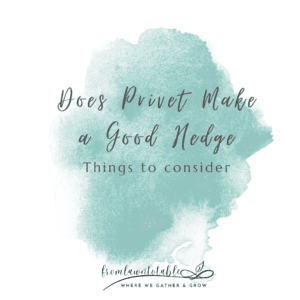
Privet is a popular choice for hedges due to its dense growth habit and ability to thrive in a variety of soil types. Some specific reasons why privet makes a good hedge include:
- Fast growth rate: Privet grows quickly, making it a good choice for establishing a hedge in a short period of time.
- Tolerance of pruning: Privet responds well to pruning, so it can be easily shaped and maintained as a hedge.
- Drought tolerance: Once established, privet is drought-tolerant and can withstand dry spells without requiring frequent watering.
- Versatility: Privet can be grown as a formal, neatly trimmed hedge or left to grow naturally for a more informal look.
- Attractive appearance: Privet has glossy green leaves and clusters of white or creamy white flowers, which add visual interest to the landscape.
- Privacy: Privet can grow up to 20 feet tall, making it an effective barrier for providing privacy.
There are a few potential disadvantages to consider:
- Invasiveness: Some species of privet are considered invasive, as they have the ability to spread aggressively and out-compete native plants, leading to habitat loss for local wildlife. If you are concerned about the potential for invasiveness, privet may not be the best choice for a hedge.
- Pests and diseases: Privet can be affected by pests such as aphids and scale insects, as well as diseases such as leaf spot and powdery mildew. If you do not want to deal with the potential for pest and disease issues, privet may not be the best choice for a hedge.
- Allergies: Some people are allergic to the pollen produced by privet, which can be a problem if the hedge is planted near a frequently used area.
- Thorns: Some species of privet have thorns, which can be a problem if the hedge is planted near a frequently used area.
- Limited color: Privet has small, white flowers and green leaves, which can be attractive, but it does not have the range of flower colors that some other types of hedges do.
Overall, while privet has many benefits as a hedge, its potential for invasiveness, susceptibility to pests and diseases, potential to cause allergies, presence of thorns in some species, and limited color range may be disadvantages for some gardeners.
We at From Lawn to Table recommend you consider your values when choosing the right varieties for your hedge. Knowing your why ahead of time can help you to choose the best plants that fit your lifestyle.